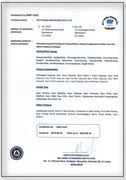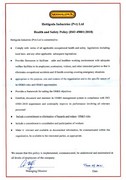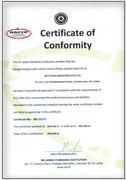About Us
Standards
Quality assurance, or QA for short, is the set of planned and systematic actions necessary to provide appropriate confidence that a product will satisfy the requirements for quality.
Quality assurance applies to all forms of products and services. These protocols introduced the rules: "fit for purpose" and "do it right the first time". It includes the regulation of the quality of raw materials, assemblies, products and components; services related to production; and management, production, and inspection processes to survive in the competitive market, and for which it is essential to satisfy the customer by providing products with zero defects.
This also leads to increased productivity, reduced quality cost and eventually increased sales and market profits.
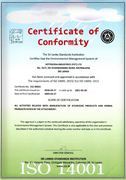
ISO 14001: 2015
(EMS – Environmental Management System)
Hettigoda Industries (Pvt) Ltd obtained the ISO 14001 Environmental Management System certification in 2003 and updated to ISO 14001: 2015 (this is a part of the overall management system which includes organisational structure, planning activities, responsibilities, procedures, processes & resources for developing, implementing, achieving, reviewing & maintaining the environmental policy).
The ISO 14000 Environmental Management Standards exist to help organisations minimise how their operations negatively affect the environment (cause adverse changes to air, water or land) and comply with applicable laws and regulations.
ISO 14001 is the international specification for an environmental management system (EMS). It specifies requirements for establishing an environmental policy, determining environmental aspects and impacts of products/activities/services, planning environmental objectives and measurable targets, implementation and operation of programmes to meet objectives and targets, checking and corrective action, and management review.
Click to view
Hettigoda Industries (Pvt) Ltd obtained the ISO 14001 Environmental Management System certification in 2003 and updated to ISO 14001: 2015 (this is a part of the overall management system which includes organisational structure, planning activities, responsibilities, procedures, processes & resources for developing, implementing, achieving, reviewing & maintaining the environmental policy).
The ISO 14000 Environmental Management Standards exist to help organisations minimise how their operations negatively affect the environment (cause adverse changes to air, water or land) and comply with applicable laws and regulations.
ISO 14001 is the international specification for an environmental management system (EMS). It specifies requirements for establishing an environmental policy, determining environmental aspects and impacts of products/activities/services, planning environmental objectives and measurable targets, implementation and operation of programmes to meet objectives and targets, checking and corrective action, and management review.
Click to view
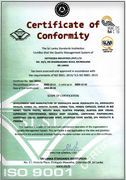
ISO 9001: 2005
Quality Management System
Quality Management System
Hettigoda Industries (Pvt.) Ltd obtained the ISO 9001:2000 Quality Management System in 1994 and updated to ISO 9001: 2015.
ISO 9000 is a family of standards for quality management systems. ISO 9000 is maintained by ISO, the International Organization for Standardization and is administered by accreditation and certification bodies. Some of the requirements in ISO 9001 (which is one of the standards in the ISO 9000 family) include:
ISO 9000 is a family of standards for quality management systems. ISO 9000 is maintained by ISO, the International Organization for Standardization and is administered by accreditation and certification bodies. Some of the requirements in ISO 9001 (which is one of the standards in the ISO 9000 family) include:
- a set of procedures that cover all key processes in the business
- monitoring processes to ensure they are effective
- keeping adequate records
- checking output for defects, with appropriate and corrective action where necessary
- regularly reviewing individual processes and the quality system itself for effectiveness
- facilitating continual improvement.
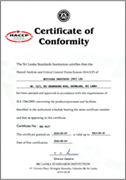
HACCP
HACCP is a methodology and management system of maximizing product safety. This stands for Hazard Analysis Critical Control Point. Hettigoda Industries (Pvt.) Ltd obtained this certification in 2010 from Sri Lanka Standards Institution.
Within this system we assess all aspects of food safety from raw material sourcing through processing and distribution to final use by the consumer.
By identifying where the hazards are likely to occur in the process, we have the opportunity to put in place the measures needed to prevent those hazards occurring. This reduces the risk of manufacturing and selling unsafe products.
Within this system we assess all aspects of food safety from raw material sourcing through processing and distribution to final use by the consumer.
By identifying where the hazards are likely to occur in the process, we have the opportunity to put in place the measures needed to prevent those hazards occurring. This reduces the risk of manufacturing and selling unsafe products.
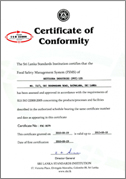
ISO 22000: 2018
Food Safety Management System
Hettigoda Industries (Pvt.) Ltd obtained the ISO 22000 Food Safety Management Systems in 2010 from Sri Lanka Standards Institution and updated to ISO 22000: 2018.
ISO 22000 is a global food safety standard, which designed to enable organization to control food safety hazards along the food chain in order to ensure that food is safe at the time of consumption.
ISO 22000 combine the HACCP plan with PreRequisite Programmes (PRP's) & Operational PreRequisite Programmes (OPRP's) in to a single integrated FSM system.
ISO 22000 is a global food safety standard, which designed to enable organization to control food safety hazards along the food chain in order to ensure that food is safe at the time of consumption.
ISO 22000 combine the HACCP plan with PreRequisite Programmes (PRP's) & Operational PreRequisite Programmes (OPRP's) in to a single integrated FSM system.
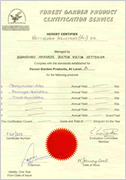
GMP (Good Manufacturing Practices)
GMP Ensure that their products are safe, pure, and effective. GMP enables companies to minimise or eliminate instances of contamination, mix ups and errors. This in turn, protects the consumer from purchasing a product which is not effective or even dangerous. A key issue for product safety is the risk of cross contamination occurring during the process from the internal factory environment. Most of these issues can be managed through adherence to good manufacturing practices (GMP). This standard explains hygienic practices that should be followed in manufacturing foods, starting from raw material stage through to finished consumer product.
GMP regulations address issues including record keeping, personal qualifications, sanitation, cleanliness, equipment verification, process validation and complaint handling.
GMP regulations address issues including record keeping, personal qualifications, sanitation, cleanliness, equipment verification, process validation and complaint handling.

Superbrand
Siddhalepa has a long and distinguished history of using natural products to provide preventive and curative health care. It has succeeded in blending an indigenous heritage with modern technology and business practices to create a unique Sri Lankan brand.
In recognition of its brand value, Superbrand Council UK has awarded Siddhalepa with Superbrand status.
Superbrand is an independent arbiter on branding and it grants Superbrand status to brands considered to warrant that award by their independent and honorary councils.
In recognition of its brand value, Superbrand Council UK has awarded Siddhalepa with Superbrand status.
Superbrand is an independent arbiter on branding and it grants Superbrand status to brands considered to warrant that award by their independent and honorary councils.

US Food and Drug Administration
US Food and Drug Administration Approvals.
Siddhalepa is registered with the FDA (US Food and Drug Administration).
FDA's mission is to promote and protect the public health by helping safe and effective products reach the market in a timely way. To monitor products for continued safety after they are in use, and to help the public get the accurate, science-based information needed to improve health.
FDA is the federal agency responsible for ensuring that foods are safe, wholesome and sanitary; human and veterinary drugs, biological products, and medical devices are safe and effective; cosmetics are safe; and electronic products that emit radiation are safe. FDA also ensures that these products are honestly, accurately and informatively represented to the public. Some of the agency's specific responsibilities include labeling, safety of all food products, etc.
US Food and Drug Administration Approvals.
Siddhalepa is registered with the FDA (US Food and Drug Administration).
FDA's mission is to promote and protect the public health by helping safe and effective products reach the market in a timely way. To monitor products for continued safety after they are in use, and to help the public get the accurate, science-based information needed to improve health.
FDA is the federal agency responsible for ensuring that foods are safe, wholesome and sanitary; human and veterinary drugs, biological products, and medical devices are safe and effective; cosmetics are safe; and electronic products that emit radiation are safe. FDA also ensures that these products are honestly, accurately and informatively represented to the public. Some of the agency's specific responsibilities include labeling, safety of all food products, etc.

Good Manufacturing Practices Certification
Good Manufacturing Practices Certification (GMP).
SLSI operates a GMP Certification Scheme to the food industry and services based on the Sri Lanka Standard on Code of practice for general principles of food hygiene. In case where a Sri Lanka Standard on code of practice for the industry or service concerned is available, that specific standard is also considered for granting certification in addition to SLS standards. Regular post certification inspections will be arranged by the SLSI to assess the effectiveness of GM practices.
Good Manufacturing Practices Certification (GMP).
SLSI operates a GMP Certification Scheme to the food industry and services based on the Sri Lanka Standard on Code of practice for general principles of food hygiene. In case where a Sri Lanka Standard on code of practice for the industry or service concerned is available, that specific standard is also considered for granting certification in addition to SLS standards. Regular post certification inspections will be arranged by the SLSI to assess the effectiveness of GM practices.

PZN - Pharmaceutical Registration Number (Pharmazentralnummer)
The Pharmaceutical Registration Number (PZN – „Pharmazentralnummer“) is issued from the Information Centre for Medicine in Germany (IFA –„Informationsstelle für Arzneispezialitäten“ ) to all pharmacy - dependent products (# 25 Pharma operations regulation). In addition to the well-designed identification of a finished medicament packet (manufacturer, pharmaceutical form, strength, size of packet), the PZN number is also the basis for odering systems and clearance of medicines in the health sector.
Siddhalepa has acquired registration under the IFA in Germany for over 40 products such as: Siddhalepa balm, Ayurveda oils, Elixirs, Teas, Capsules, Toothpastes, Soaps, Shampoo and Cream, so that these pruducts can be sold in pharmacies as well.
Siddhalepa has acquired registration under the IFA in Germany for over 40 products such as: Siddhalepa balm, Ayurveda oils, Elixirs, Teas, Capsules, Toothpastes, Soaps, Shampoo and Cream, so that these pruducts can be sold in pharmacies as well.


